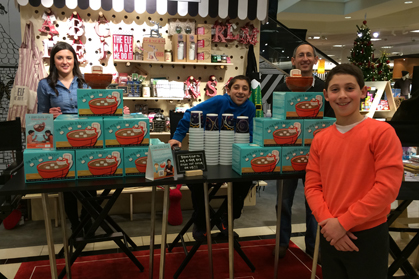
Whether you’re trying to start a business, a nonprofit or your next passion project, innovation will be at the heart of it. And what is innovation really? It’s creativity spurred by change. So what does it take to innovate and bring your creative ideas to light? In order to answer this question, we must first deconstruct what creativity is.
Many people believe creativity to be something that’s hardwired into your gene; something you’re either born with or not. You’ll hear it being said in refrains like, ‘He’s the creative one in the family,’ or ‘I don’t have a creative bone in my body.’ But many of the world’s most creative people will tell you that creativity is not contrived, but rather something they’ve recognize, digested and regurgitated through their own lens.
Author Elizabeth Gilbert in “Eat, Pray, Love” describes creativity not as something you are but something that flows through you. And Steve Jobs explains creativity this way. “Creativity is just connecting things. When you ask creative people how they did something, they feel a little guilty because they didn’t really do it, they just saw something.”
Connecting dots is actually more intricate and requires more discipline than splashing paint onto a canvas. That’s because creativity can’t solely exist in our heads and it can’t appeal only to its maker. Creativity as we know it is relevant, usually solves a problem, and goes through many iterations that require hard work and persistence. Having interviewed some of the most enterprising kids around today, what I’ve discovered is that creative children, though they may be spontaneous at times, have adopted key habits that enable them to go from creative insight to creative output. Here are seven habits that can help prepare you turn your next lightening bulb into a brilliant tangible.
1.Know your identity. It’s possible to know your identity even before you know how to eloquently express what that is. Identity is more than an affiliation, like I’m a soccer player, I’m a brother, or I’m a fifth-generation redhead. Affiliations may offer clues to your identity, but your identity is not formed by your experiences or something you acquire by birth. Your identity, instead, is the fingerprint of your soul, the part of you that is unchanging. It’s the source of that feeling deep inside you that drives you to discover what you were meant to contribute in this world. It’s what you stand for.
“Brilliant thinking requires understanding who is doing the thinking, and understanding how what is being created relates to the values of the thinker,” says author Gerald Sindell in “Discover Your Genius.”
Not only does knowing your identity provide the foundation for your next brilliant idea, but identity serves as a check on whether what you are developing reflects the true you. To be in opposition with yourself is a hindrance to creativity. But when you’re in tune with your identity and what you want to offer the world, you will be driven all the more to do it because without your unique perspective, you’ll know the world would have lost out on something.
2. Have open networks. The number one predictor of success, according to research conducted by scientist Ron Burt, is being in an open network instead of a closed one. An open network means being exposed to different groups of people and ideas, instead of surrounding yourself with like-minded people who validate what you already know. Being in an open network, then, requires that you often put yourself in uncomfortable situations with people who are different from you. Steve Jobs explains why having an open network is essential to the creative process.
“It seemed obvious to them after a while. That’s because they were able to connect experiences they’ve had and synthesize new things. And the reason they were able to do that was that they’ve had more experiences or they have thought more about their experiences than other people. Unfortunately, that’s too rare a commodity. A lot of people in our industry haven’t had very diverse experiences. So they don’t have enough dots to connect, and they end up with very linear solutions without a broad perspective on the problem. The broader one’s understanding of the human experience, the better design we will have.”
Having an open network can mean joining different organizations and socializing with people you wouldn’t normally interact with. But let’s not forget the easiest way to enlighten your perspective: reading. Many of the world’s most successful entrepreneurs will tell you they spend hours a day reading. … [rich investor] Being informed of current events and trends in various industries is one way to have at least a cursory understanding to help form your business decisions in a way that’s relevant and inclusive.
3. Be playful. Enterprising kids who manage to make their ideas a reality maintain a playful attitude towards their pursuit. They don’t take themselves so seriously. Cultivating a childlike sense of play is one of the traits creative adult geniuses employ, because playfulness provides lightness and flexibility when generating new ideas. Playfulness helps you work steadily towards a goal without becoming stressed or depleted. It keeps you from giving up too soon. In other words, playfulness is the portal to persistence.
4. Spend time alone. Call it what you like, daydreaming, meditating or spending time in solitude. When you’ve had a chance to catch up with your thoughts – away from your computer, TV, phone and game consoles – is when you have epiphanies, connect dots, and dream up solutions.Writing in a gratitude journal or spending time outside in nature opens up your mind and helps you get in touch with your perspective. Spending time alone is also when you form convictions and discover those things that matter to you. When you spend time alone, you get to know yourself. It’s also the time when you discover your identity.
5. Turn adversity into an advantage. Creativity more often than not happens because of challenges, not in spite of them. Psychologists studying post-traumatic growth have found that many people are able to find substantial creative growth in the wake of hardships and adversity. Max Ash had an innovative idea to create a mug with a hoop attached to it. Max was driven to solve an age-old problem of not being able to play with your food, but it was just as important for him to show the world what dyslexics could do and showcase their cognitive strengths and ability to think differently.
Or take Lane Karlitz who had difficulty in his Spanish class. He adopted a different way of studying and created an app that makes study songs so student could sing their study material. Not only did he experience the pangs of learning a new language, but he paid attention to the gripes of his friends and became inspired to make studying easier and more enjoyable for all.
Kayla Abramowitz also formed her non-profit in the wake of lengthy hospital visits while trying to get diagnosed for Crohn’s disease. Through her own, often boring hospital visits, she decided there was a way to help other children feel better by distributing DVDs, game consoles and other entertainment material to children’s hospitals around the country. Embracing a challenge and finding a solution is the very food that feeds creativity.
[Related: Max Ash and Lane Karlitz Articles]
6. Defy peer pressure. Original thinking won’t see the light of day if you don’t have the courage to share your vision with the world. I always think of fashion pioneer Marc Jacobs who wears his insecurity on his sleeve. I’m struck by how insecure he claims to be and how he manages to produce his clothing lines season after season.
Overcoming peer pressure requires that you value your ideas more than the judgment of others. Creative people have fear just like everyone else and they may care a great deal about what others think of them. They just do things in spite of their fear because they have kept up the discipline to develop a talent, maintain a support group, help others, and spend enough time alone to validate and form strong convictions that don’t shake easy.
7. Find support. For many, this may seem like the hardest habit to form because it’s the part that’s seemingly out of your control. But that’s not true. You have to find your cheerleaders. Even if you feel that there is no one in your corner at the moment, don’t sit there passively pitying yourself. It’s more than possible to find a mentor, bring a friend along for the journey or share your ideas with a relative. Seldom do great ideas become tangible products without the support of somebody else.
One of the most startling discoveries I’ve made while interviewing many kidpreneurs, is that creative children have an immense support group. Many of these creative children, who have manifested their creativity in tangible ways have had a parent, teacher, community member, or friend cheerlead them on when they were discouraged.
While trying to create his study app, many people discouraged Lane’s idea for being too technical. But his parents supported his vision. And Max was encouraged by his parents to take a mug he made in his ceramics class and mass-produce it because his parents believed in his ability to think differently. And Kayla’s friends helped her go door to door collecting DVDs. A support group, or person (you just need one), will encourage you when you run low on fumes, which will undeniably happen.



